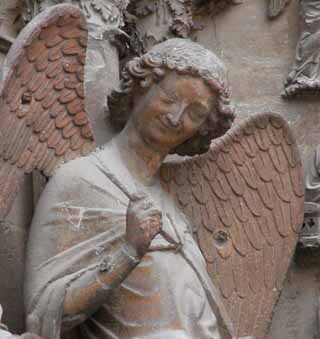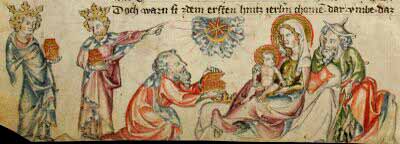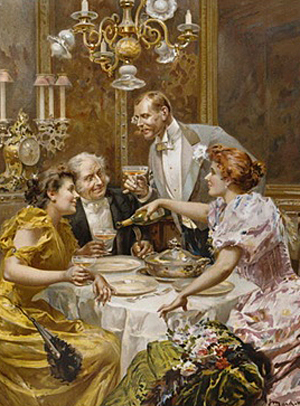 |
Catholic Customs
Preparing Soul and Body for Christmas
Plinio Corrêa de Oliveira
Some of you have asked me how an ideal commemoration of Christmas should be in our days. I believe that the way we commemorate Christmas needs to be revised if we want to understand the ideal way to celebrate it.
There is a principle in Catholic doctrine that teaches us that since man is constituted of soul and body, the joys as well as the sorrows of a well-ordered man should be greater for his soul than his body. The life of a well-ordered Catholic must give more importance to what concerns his soul rather than his body.
The fundamental joy of a Catholic
What are the joys of a Catholic?
The Catholic whose conscience is in order knows that he is a successful man. This is a fundamental point. Each of us who lives in the state of grace, dies in the state of grace, and goes to Heaven has a completely fulfilled life. He was successful when he lived, when he died, and for all eternity.

The smiling Angel of Reims expresses the joy
of a Catholic who lives in the state of grace |
No matter how many surprises, sufferings, disappointments and frustrations he might have, a fundamental joy should exist in that man. He can say: “I am in the grace of God; therefore I am in the correct state. Whatever else befalls me is either because God permits it or because I did not take the right stance in face of certain problems.” When his judgment time comes, he may pass through Purgatory, but in the end he will go to Heaven, and, therefore, his life is a success – he is a successful man.
This fundamental joy of having a peaceful conscience, of having a life that is successful in what is essential, is the joy of a Catholic. It gives him stability and peace, and disposes him to judge everything from the highest perspective. He sees the things that happen on earth from a higher and more translucent prism, which frees him from the afflictions, disquiet and anxieties characteristic of the people of our days. This, then, is the fundamental joy of the Catholic.
Preparing the soul for Christmas
The feasts of the Church provide us abundant opportunity to have joy. Among them, Christmas is the one that shines out in this respect.
In the ambience that surrounded Christmas there was a fundamental joy that came from all the graces that descended on mankind at the birth of Our Lord. Anne Catherine Emmerick and Blessed Maria de Agreda tell us that all nature, including the vegetable and mineral kingdoms, shone with a special splendor on Christmas night in commemoration of the coming of the Savior to the world.
In the Catholic Liturgy and traditions, we find many other joys in the preparation for and celebration of Christmas. Some vestiges of this joy still remain in the ecclesiastical structure we see around us – where we only see vestiges of the Catholic Church [these comments were made in 1971].
When I consider those graces of Christmas, the joy they inspire penetrates me profoundly. It is the joy of knowing and feeling that God reconciled Himself with man, that mercy became present among us; that Our Lord, the Sun of all virtues, made Himself small, weak and accessible, and that He came to us filled with goodness.

The greatest joy of Christmas is spiritual - preparing to receive Christ |
Because I have a Savior, I was rescued. Someone paid the debts I had no condition to pay; someone loved me with a love that I did not deserve. There is a God who comes to me even when I do not go to Him, who is concerned about me even when I do not think of Him, and who wants to save me even when I persecute Him.
Considering this, I feel a kind of peace and joy that participates in that supernatural cascade of graces that flooded nature on the first Christmas. The whole universe of which I am a part was made nobler by the fact that God became flesh and dwelt among us.
I have a special joy when I consider all these things at the foot of the Manger, kneeling before the Divine Infant, my Savior, my Redeemer and my God, and, at the same time my Brother, a Son of Our Lady like me.
Special graces normally accompany the feasts of the Church, inviting Catholics to become aware of the nobility, beauty and excellence of what is being celebrated. Thus, for me the most important thing on Christmas Night, the apex of Christmas, is not to have a Pantagruelic feast or to take part in the pagan festivities of our modern cities. It is something much more elevated than the pleasures of the flesh – even the licit and innocent ones, such as a good meal.
The double joy of Christmas comes from being in the state of grace and having God dwelling among us. “The word was made flesh and dwelt among us” - until the last day of the world whenever a person pronounces this phrase of the Creed, knees will bend. The Creed and the Angelus will be said until the final bell of the last church tolls, and Our Lord Jesus Christ returns in person. That is, this is a joy that will be repeated until the end of the world.
This joy comes from the first night of Christmas and will continue to the very end. The joy that I will have at this 1971 Christmas is a regal share of the river of joys opened by the coming of Our Lord, which will flow through the poignant prairie of this world until the end times.
Therefore, for Christmas I need to prepare my soul to experience this joy that comes from such high causes. I need to meditate and be recollected, and to realize that on Christmas night it is as if Our Lord were born again. It is as if He were present at the Manger in Bethlehem and I were there with Him. This should be my delight.
How to treat ‘brother body’
Now, it happens that man is an ensemble of soul and body. St. Francis of Assisi would affectionately refer to the body as “brother body.” Brother body asks to be well treated also during times of joy. It is normal that in a time of a great joy for the soul, we should give the body some contentment. This is the reason for the Christmas Supper. It is an extension or echo of our interior spiritual joy.
Although it is normal to have a nice Christmas Supper, it is an aberration to make it the center of our Christmas commemorations. To show no concern for preparing one’s soul and the greatest care in arranging a magnificent meal is an upside-down Christmas. This Supper should not be a Pantagruelic meal to make us feel overstuffed. It should be a light meal that gives the body a proportionate pleasure that discreetly follows the spiritual joy we are experiencing.
For example, imagine that one of us attends a Mozart concert. During the intermission he goes to a buffet and eats a huge barbecue and fills himself completely. Coming back home, someone might comment to him: “What a wonderful concert!” But he is thinking: “Really, what a wonderful barbecue!” This man squandered the benefit of the concert. He should have appreciated the exquisite music of Mozart, but instead he became incapable of appreciating anything because of the disproportionate amount of food he ate. He put things upside-down.

Imitating worldly patterns should be avoided at Christmas dinner |
Worse than this is someone who ignores the graces of Christmas because he is thinking about the supper he will have with family or friends.
The Christmas Supper should be distinguished but discreet, with certain good dishes to satisfy our appetite and give us a moderate pleasure, but it need not be a stupendous meal.
In practice, it should not be an occasion for us to eat many unusual and exceptional things that transport us to a kind of small gastronomical paradise: an exotic fowl, a super-paté, an astonishing caviar followed by a spetacular champagne. Of course, it is not the time to have a steak with two fried eggs, but also it is not the place to over-satiate ourselves.
Nor is it the place for us to put on social airs. Suppose that someone heard it was fashionable among nobles and millionaires to eat a rare, exquisite white caviar that comes from the Caspian Sea. So he also wants to have this singular dish at his Christmas Supper.
Even if he saved and could buy some of that caviar, it would not be proportional to his social level. We should not make such pretenses, especially at the Christmas Supper. Such things do not properly commemorate the Holy Christmas of Our Lord Jesus Christ. It transforms the celebration into a worldly competition or a grand dinner party.
The Catholic Supper should be good and dignified, but something that is temperate so that we can follow the sublimity of the spiritual joys of Christmas.
The joys of brother body should never suffocate the more elevated ones of sister soul.

Posted December 7, 2009

Related Topics of Interest
 The Annunciation of the Angel and the Incarnation of the Word The Annunciation of the Angel and the Incarnation of the Word
 Ara Coeli: The Altar of the Heavens for the Santo Bambino Ara Coeli: The Altar of the Heavens for the Santo Bambino
 Christmas: Victory over the Three Egoisms Christmas: Victory over the Three Egoisms
 The Fullness of Time The Fullness of Time
 The Santos of Provence The Santos of Provence

Related Works of Interest
|
Catholic Customs | Religious | Home | Books | CDs | Search | Contact Us | Donate

© 2002- Tradition in Action, Inc. All Rights Reserved
|
 |
|